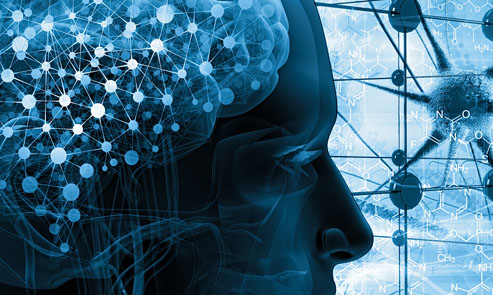
Again, it’s the ratio of the brain size to total body size that attracts scientists’ interest when considering the brain’s functional capacity. An elephant’s brain represents 1/550 of its body weight, while the human brain weighs 1/40 of the total body weight. Our brain represents about 2.5 percent of our total body weight as opposed to the large-brained elephant whose brain is just 0.18 percent of its total body weight.
But even more important than the fact that we are blessed with a lot of brain matter is the intriguing fact that, gram-for-gram, the human brain consumes a disproportionately huge amount of energy. While only representing 2.5 percent of our total body weight, the human brain consumes an incredible 22 percent of our body’s energy expenditure when at rest. This represents about 350 percent more energy consumption in relation to body weight compared with other anthropoids like gorillas, orangutans, and chimpanzees.
It takes a lot of dietary calories to keep the human brain functioning. Fortunately, the very fact that we’ve developed such a large and powerful brain has provided us with the skills and intelligence to maintain adequate sustenance during times of scarcity and to make provisions for needed food supplies in the future. Indeed, the ability to conceive of and plan for the future is highly dependent upon the evolution not only of brain size but other unique aspects of the human brain.
It is a colorful image to conceptualize early Homo sapiens migrating across an arid plain and competing for survival among animals with smaller brains yet bigger claws and greater speed. But our earliest ancestors had one other powerful advantage compared to even our closest primate relatives. The human brain developed a unique biochemical pathway that proves hugely advantageous during times of food scarcity. Unlike other mammals, our brain is able to utilize an alternative source of calories during times of starvation.
Typically, we supply our brain with glucose (blood sugar) from our daily food consumption. We continue to supply our brains with a steady stream of glucose between meals by breaking down glycogen, a storage form of glucose primarily found in the liver and muscles.
But relying on glycogen provides only short-term availability of glucose. As glycogen stores are depleted, our metabolism shifts and we are able to create new molecules of glucose, a process aptly termed gluconeogenesis. This process involves the construction of new glucose molecules from amino acids harvested from the breakdown of protein primarily found in muscle. While gluconeogenesis adds needed glucose to the system, it does so at the cost of muscle breakdown, something less than favorable for a starving hunter-gatherer.
But human physiology offers one more pathway to provide vital fuel to the demanding brain during times of scarcity. When food remains unavailable for more than 72 hours, the liver begins to use body fat to create chemicals called ketones. One ketone in particular, beta hydroxybutyrate (beta-HBA), serves as a highly efficient fuel source for the brain, allowing humans to function cognitively for extended periods during food scarcity.
Our unique ability to power our brains using this alternative fuel source helps reduce our dependence on gluconeogenesis and therefore spares amino acids and the muscles they build and maintain. Reducing muscle breakdown provides obvious advantages for hungry Homo sapiens in search of food. It is this unique ability to utilize beta-HBA as a brain fuel that sets us apart from our nearest animal relatives and has allowed humans to remain cognitively engaged and, therefore, more likely to survive the famines ever-present in our history.







